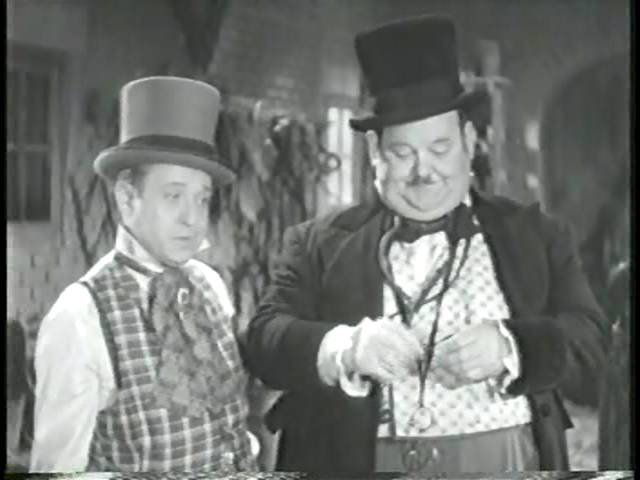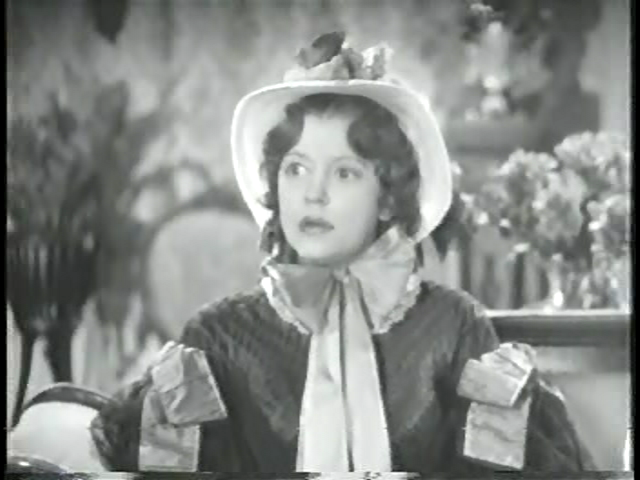Casting Pairs
I recently saw Zenobia (1939), an oddity--Oliver Hardy without Stan Laurel. The two had separate contracts with Hal Roach. Laurel's was up and he demanded better terms. To teach him a lesson, Roach co-starred Hardy with Harry Langdon. The film didn't do well so Roach was the one who learned the lesson.
The story is weak. Hardy is a doctor in a southern town in the late 1800s. Years ago, he turned his back on the non-sick rich to help the non-paying poor. (Rich people not really being sick is something you see a lot in old films.) So his family is in financial trouble--the bank owns their house and their servants don't get paid. The town's leading socialite, Alice Brady (who has put the squeeze on Hardy), has a son who falls in love with Hardy's daughter. Hardy's wife, Billie Burke, tries to entertain Brady and convince her it would be a good match.
Meanwhile, Harry Langdon is a medicine man in town with the carnival. His elephant, Zenobia, is sick, and Hardy helps treat her. Don't ask how, but Hardy is sued by Brady for stealing Langdon's elephant. Ultimately, true love and common sense conquer all.
Ridiculous, but also weird, due to the casting. Hardy is playing a role not specifically created for him, and mostly playing straight. He's a decent actor, and it's interesting to see him not steaming all the time. His team-up with Langdon is half-hearted, since Hardy is by himself much of the time, and the two start out as strangers, which is not the Laurel and Hardy way.
Langdon was never good in sound. A significant silent clown, he didn't quite manage the transition (though his career was on the way down even before). On paper he seems like a good choice. I've always felt Laurel got a lot of his famous character from Langdon, who was well-established when Stan teamed with Ollie. Both Langdon and Laurel are innocents, children in men's bodies, facing much of the world with blank incomprehension.
The comedy generally doesn't work (which figures, since Laurel was the comic brains behind the duo). A lot of it is bad farce with an elephant. But it's the other part of the story which fascinates me. Not just Hardy playing a serious character, but the rest of the cast.
Above all, it's bizarre to see Brady and Burke playing scenes. They were best known in the 30s for the same character--a dizzy social matron. Shouldn't they cancel each other out? The film also features perhaps the two best known African-American film actors of the decade, Hattie McDaniel and Stepin Fetchit. Imagine if, along with these two, Hal Roach also hired Louise Beavers and Willie Best and you see how odd it is to have Brady and Burke together.
Burke plays her regular role while Brady is more an eccentric, condescending society lady. (She had range, of course--she'd won an Oscar as Mrs. O'Leary.) At the end, when everyone makes up, we get to see Brady imitating Burke's flakiness. I think Brady is the better actor.
But I haven't gotten to the most astounding part of the movie. Philip Hurlic is Zeke, the young black servant. He complains to Hardy that he can't go to white parties. Hardy, who proudly displays a copy of the Declaration of Independence above his desk, explains to Zeke that he's just as good as anyone, and so he shouldn't feel ashamed if he goes to one sort of party while others go to another sort. In fact, he has the kid memorize and later recite the document (in a scene stolen from Ruggles Of Red Gap). Yes, Hardy uses the Declaration of Independence to justify segregation. Of course, separate but equal was the law of the land in 1939--so, legally speaking, I guess he was right back then.



0 Comments:
Post a Comment
<< Home